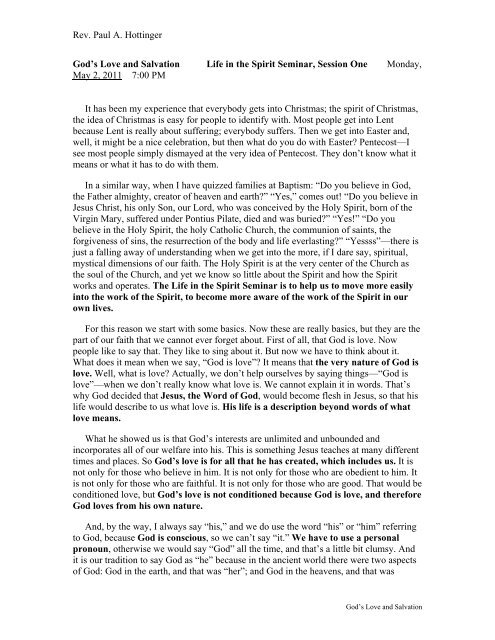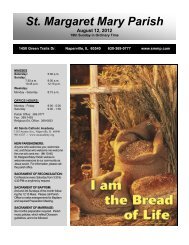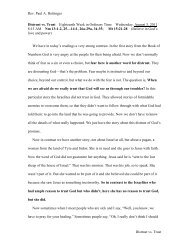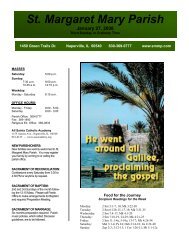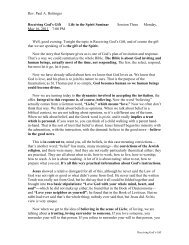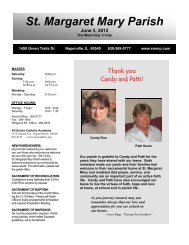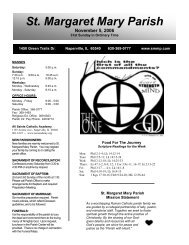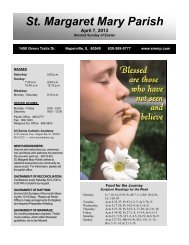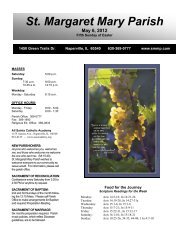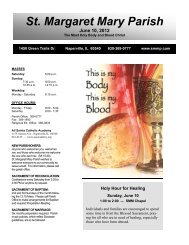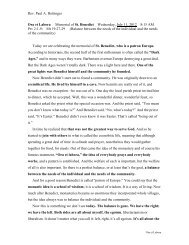God's Love and Salvation, Life in the Spirit Seminar
God's Love and Salvation, Life in the Spirit Seminar
God's Love and Salvation, Life in the Spirit Seminar
- No tags were found...
Create successful ePaper yourself
Turn your PDF publications into a flip-book with our unique Google optimized e-Paper software.
Rev. Paul A. Hott<strong>in</strong>gerGod’s <strong>Love</strong> <strong>and</strong> <strong>Salvation</strong> <strong>Life</strong> <strong>in</strong> <strong>the</strong> <strong>Spirit</strong> Sem<strong>in</strong>ar, Session One Monday,May 2, 2011 7:00 PMIt has been my experience that everybody gets <strong>in</strong>to Christmas; <strong>the</strong> spirit of Christmas,<strong>the</strong> idea of Christmas is easy for people to identify with. Most people get <strong>in</strong>to Lentbecause Lent is really about suffer<strong>in</strong>g; everybody suffers. Then we get <strong>in</strong>to Easter <strong>and</strong>,well, it might be a nice celebration, but <strong>the</strong>n what do you do with Easter? Pentecost—Isee most people simply dismayed at <strong>the</strong> very idea of Pentecost. They don’t know what itmeans or what it has to do with <strong>the</strong>m.In a similar way, when I have quizzed families at Baptism: “Do you believe <strong>in</strong> God,<strong>the</strong> Fa<strong>the</strong>r almighty, creator of heaven <strong>and</strong> earth?” “Yes,” comes out! “Do you believe <strong>in</strong>Jesus Christ, his only Son, our Lord, who was conceived by <strong>the</strong> Holy <strong>Spirit</strong>, born of <strong>the</strong>Virg<strong>in</strong> Mary, suffered under Pontius Pilate, died <strong>and</strong> was buried?” “Yes!” “Do youbelieve <strong>in</strong> <strong>the</strong> Holy <strong>Spirit</strong>, <strong>the</strong> holy Catholic Church, <strong>the</strong> communion of sa<strong>in</strong>ts, <strong>the</strong>forgiveness of s<strong>in</strong>s, <strong>the</strong> resurrection of <strong>the</strong> body <strong>and</strong> life everlast<strong>in</strong>g?” “Yessss”—<strong>the</strong>re isjust a fall<strong>in</strong>g away of underst<strong>and</strong><strong>in</strong>g when we get <strong>in</strong>to <strong>the</strong> more, if I dare say, spiritual,mystical dimensions of our faith. The Holy <strong>Spirit</strong> is at <strong>the</strong> very center of <strong>the</strong> Church as<strong>the</strong> soul of <strong>the</strong> Church, <strong>and</strong> yet we know so little about <strong>the</strong> <strong>Spirit</strong> <strong>and</strong> how <strong>the</strong> <strong>Spirit</strong>works <strong>and</strong> operates. The <strong>Life</strong> <strong>in</strong> <strong>the</strong> <strong>Spirit</strong> Sem<strong>in</strong>ar is to help us to move more easily<strong>in</strong>to <strong>the</strong> work of <strong>the</strong> <strong>Spirit</strong>, to become more aware of <strong>the</strong> work of <strong>the</strong> <strong>Spirit</strong> <strong>in</strong> ourown lives.For this reason we start with some basics. Now <strong>the</strong>se are really basics, but <strong>the</strong>y are <strong>the</strong>part of our faith that we cannot ever forget about. First of all, that God is love. Nowpeople like to say that. They like to s<strong>in</strong>g about it. But now we have to th<strong>in</strong>k about it.What does it mean when we say, “God is love”? It means that <strong>the</strong> very nature of God islove. Well, what is love? Actually, we don’t help ourselves by say<strong>in</strong>g th<strong>in</strong>gs—“God islove”—when we don’t really know what love is. We cannot expla<strong>in</strong> it <strong>in</strong> words. That’swhy God decided that Jesus, <strong>the</strong> Word of God, would become flesh <strong>in</strong> Jesus, so that hislife would describe to us what love is. His life is a description beyond words of whatlove means.What he showed us is that God’s <strong>in</strong>terests are unlimited <strong>and</strong> unbounded <strong>and</strong><strong>in</strong>corporates all of our welfare <strong>in</strong>to his. This is someth<strong>in</strong>g Jesus teaches at many differenttimes <strong>and</strong> places. So God’s love is for all that he has created, which <strong>in</strong>cludes us. It isnot only for those who believe <strong>in</strong> him. It is not only for those who are obedient to him. Itis not only for those who are faithful. It is not only for those who are good. That would beconditioned love, but God’s love is not conditioned because God is love, <strong>and</strong> <strong>the</strong>reforeGod loves from his own nature.And, by <strong>the</strong> way, I always say “his,” <strong>and</strong> we do use <strong>the</strong> word “his” or “him” referr<strong>in</strong>gto God, because God is conscious, so we can’t say “it.” We have to use a personalpronoun, o<strong>the</strong>rwise we would say “God” all <strong>the</strong> time, <strong>and</strong> that’s a little bit clumsy. Andit is our tradition to say God as “he” because <strong>in</strong> <strong>the</strong> ancient world <strong>the</strong>re were two aspectsof God: God <strong>in</strong> <strong>the</strong> earth, <strong>and</strong> that was “her”; <strong>and</strong> God <strong>in</strong> <strong>the</strong> heavens, <strong>and</strong> that wasGod’s <strong>Love</strong> <strong>and</strong> <strong>Salvation</strong>
“him.” Well, we don’t believe that God is <strong>the</strong> earth. The earth is <strong>the</strong> creation; we dobelieve God is transcendent—also immanent, but not identified with <strong>the</strong> earth. In fact, <strong>in</strong><strong>the</strong> biblical view it’s Adam <strong>and</strong> Adamma, humanity <strong>and</strong> <strong>the</strong> earth, that have thatrelationship, not God <strong>and</strong> <strong>the</strong> earth. So <strong>in</strong> many ways we have taken <strong>the</strong> role of God <strong>in</strong><strong>the</strong> ancient myths; that’s what <strong>the</strong> Bible has done for us. It has put us <strong>in</strong> <strong>the</strong> role that <strong>the</strong>ancient myths had for <strong>the</strong> gods. We are <strong>the</strong> gods now. And that means that our will isvery important because we are all endowed with free will. In our free will we canrespond to God or we can reject God.It is very important that we keep that <strong>in</strong> m<strong>in</strong>d, that we have free will because <strong>the</strong>creative work of God <strong>in</strong>cludes <strong>and</strong> susta<strong>in</strong>s absolutely everyth<strong>in</strong>g. It says <strong>in</strong> <strong>the</strong> prologueof John’s Gospel: “Noth<strong>in</strong>g came to be apart from <strong>the</strong> Word”—“Noth<strong>in</strong>g came to beapart from <strong>the</strong> Word.” It’s impossible for anyth<strong>in</strong>g to exist that is not brought <strong>in</strong>toexistence <strong>and</strong> kept <strong>in</strong> existence by <strong>the</strong> Word of God. So St. Paul says, “We live <strong>and</strong>move <strong>and</strong> have our be<strong>in</strong>g <strong>in</strong> God.” He isn’t just talk<strong>in</strong>g about believers. He is not justtalk<strong>in</strong>g about good people. He is not talk<strong>in</strong>g about people who believe <strong>the</strong> way hebelieves. He is talk<strong>in</strong>g about everyth<strong>in</strong>g; everyth<strong>in</strong>g lives <strong>and</strong> moves <strong>and</strong> has its be<strong>in</strong>g<strong>in</strong> God. There is no o<strong>the</strong>r possible mode of existence. Even <strong>the</strong> devil has this existence <strong>in</strong>God. And even s<strong>in</strong>—St. Thomas talks about this—even s<strong>in</strong> exists <strong>in</strong> God, <strong>in</strong> this sense:that God has to actually participate <strong>in</strong> our s<strong>in</strong> because <strong>the</strong>re is noth<strong>in</strong>g we can dowithout God. Now Thomas is appalled by this <strong>in</strong> one way. But he says it’s a sign of howmuch God loves us <strong>and</strong> wants us to be free, <strong>and</strong> would ra<strong>the</strong>r cooperate <strong>in</strong> ourwillful rejection of him than to have us not free to reject him. So I want you to th<strong>in</strong>kabout that, how God is love <strong>and</strong> we are free; we are free to take God or not; we arefree to reject God.Yesterday we celebrated Div<strong>in</strong>e Mercy Sunday. Div<strong>in</strong>e Mercy Sunday is a recentfeast, a recent memorial, you might say, that is based on <strong>the</strong> teach<strong>in</strong>gs of a particularsister, a particular nun, who received, you might say, private revelations, which <strong>the</strong>Church does not necessarily approve of, but which fit so well with <strong>the</strong> gospel. And <strong>the</strong>sehave to do with <strong>the</strong> fact that God’s love never stops, <strong>and</strong> that we need to keep pray<strong>in</strong>gfor every person because <strong>the</strong>oretically, <strong>and</strong> Pope John Paul put it this way, <strong>the</strong>oreticallyevery s<strong>in</strong>gle person can be saved. And Pope John Paul said we need to hope for that <strong>and</strong>pray for that, <strong>the</strong> salvation of every s<strong>in</strong>gle person. Whe<strong>the</strong>r that is likely or probable, isano<strong>the</strong>r matter, but we need to recognize its possibility <strong>and</strong> want its possibility. That’sgood for us to want that possibility <strong>and</strong> to pray for that possibility <strong>and</strong> to recognize thatGod has never pushed anyone away. Any push<strong>in</strong>g is on our side.Now when God revealed himself to Moses, if you remember <strong>the</strong> story <strong>in</strong> Exodus <strong>and</strong><strong>the</strong> burn<strong>in</strong>g bush, <strong>and</strong> Moses said after he was commissioned to go to pharaoh, he said,“Oh, by <strong>the</strong> way, whom should I say has sent me?” And God said to him, “I AM WHOAM.” So not only is God love, but God is <strong>the</strong> ground of awareness. Human awarenessitself is a reflection of God <strong>and</strong> <strong>the</strong> div<strong>in</strong>e nature. So when we read <strong>in</strong> <strong>the</strong> Book ofGenesis that God created human be<strong>in</strong>gs <strong>in</strong> his image <strong>and</strong> likeness, it means with thisability to be conscious of self, which if you th<strong>in</strong>k about it, is actually a prerequisite tofreedom. Without be<strong>in</strong>g aware of ourselves, we really wouldn’t be free.2 God’s <strong>Love</strong> <strong>and</strong> <strong>Salvation</strong>
Now <strong>the</strong> problem is we are liv<strong>in</strong>g <strong>in</strong> a world <strong>in</strong> which many people have made verylittle effort <strong>and</strong> our society makes no effort, our culture makes no effort, to reflect <strong>the</strong>sepossibilities, <strong>the</strong>se realities: <strong>the</strong> div<strong>in</strong>e be<strong>in</strong>g of love; <strong>the</strong> <strong>in</strong>clusion of all th<strong>in</strong>gs <strong>in</strong> that, <strong>in</strong>God’s love; <strong>the</strong> groundedness of consciousness <strong>in</strong> God, which is reflected <strong>in</strong> ourselves<strong>and</strong> <strong>the</strong>refore our likeness unto God—that is not someth<strong>in</strong>g our culture acknowledges,talks about, reflects upon. It did at some po<strong>in</strong>t <strong>in</strong> <strong>the</strong> history of Europe. The great culturaldevelopments <strong>in</strong> Europe dur<strong>in</strong>g <strong>the</strong> Middle Ages were <strong>the</strong> ca<strong>the</strong>drals, but we don’t havethose k<strong>in</strong>ds of ca<strong>the</strong>drals. We don’t have cultural icons reflect<strong>in</strong>g <strong>the</strong> truths of <strong>the</strong>gospel. So we are <strong>in</strong> a special situation; we have to acknowledge it.So <strong>the</strong>refore we grew up <strong>in</strong> a society very often not even stimulated with any k<strong>in</strong>dof dream<strong>in</strong>g about <strong>the</strong> big picture, about <strong>the</strong> purpose of life. We search for security,yes; everyone wants to be secure. Everyone experiences fear <strong>and</strong> anxiety. But we oftendon’t search for more than security. And security we often <strong>in</strong>terpret <strong>in</strong> a materialistic waybecause we live <strong>in</strong> a society that <strong>in</strong>terprets everyth<strong>in</strong>g materialistically. And humanbe<strong>in</strong>gs are created to adapt, so we adapt, unfortunately <strong>in</strong> this case, to a very materialisticstatus quo <strong>in</strong> which <strong>the</strong> real questions are never raised. Why are we here? What is <strong>the</strong>reason for our existence?Now our Scriptures give us a story, a story of God’s <strong>in</strong>vit<strong>in</strong>g, God’s <strong>in</strong>vit<strong>in</strong>g us toa relationship <strong>and</strong>, by <strong>the</strong> way, reveals <strong>the</strong> fact that God is himself relational. Andwe call <strong>the</strong>se relations “Fa<strong>the</strong>r,” “Son,” “<strong>Spirit</strong>.” Fa<strong>the</strong>r, Son, <strong>and</strong> <strong>Spirit</strong> are threerelations. And God <strong>in</strong>vites us <strong>in</strong>to this life of, we call it, <strong>the</strong> “Tr<strong>in</strong>ity.” In <strong>the</strong> Tr<strong>in</strong>ity<strong>the</strong>re is a communion of love <strong>and</strong> shar<strong>in</strong>g of all be<strong>in</strong>g, <strong>and</strong> it is this that God is<strong>in</strong>vit<strong>in</strong>g us to share <strong>in</strong>.Now on <strong>the</strong> one h<strong>and</strong>, as I mentioned before, everyth<strong>in</strong>g is <strong>in</strong> God <strong>and</strong> cannot not be<strong>in</strong> God; but on <strong>the</strong> o<strong>the</strong>r h<strong>and</strong>, we are free to separate ourselves <strong>in</strong> terms of our will, <strong>in</strong>terms of our choices, <strong>in</strong> terms of our decisions. We are free to take our own journey, butGod really wants us with him, <strong>and</strong> God really wants us <strong>in</strong> an <strong>in</strong>timate relationship.Formal religion has not always brought about this because as children are brought <strong>in</strong>toreligion <strong>and</strong> as people grow up, life takes a certa<strong>in</strong> sort of autonomy; it has a life of itsown. Because of this we often don’t actually develop <strong>the</strong> sort of <strong>in</strong>timacy that God isoffer<strong>in</strong>g us. In fact, many people don’t even know about it, <strong>and</strong> follow, what you mightcall, a mechanical way of life; that is, <strong>the</strong>y go through certa<strong>in</strong> motions: <strong>the</strong>y do certa<strong>in</strong>th<strong>in</strong>gs, <strong>the</strong>y may be good th<strong>in</strong>gs, <strong>the</strong>y may go to Mass, <strong>the</strong>y may pray <strong>the</strong> rosary, <strong>the</strong>ymay do all k<strong>in</strong>ds of wonderful th<strong>in</strong>gs, but <strong>the</strong>y don’t open <strong>the</strong>ir hearts to <strong>the</strong> presenceof God. Therefore <strong>the</strong>y really cheat <strong>the</strong>mselves from someth<strong>in</strong>g that is very rich.Now we have all been <strong>in</strong>troduced <strong>in</strong>to <strong>the</strong>se <strong>in</strong>vitations through <strong>the</strong> sacraments. Thesacramental life of <strong>the</strong> Church is <strong>the</strong> posit<strong>in</strong>g, <strong>the</strong> giv<strong>in</strong>g, of <strong>the</strong>se gifts, <strong>the</strong>se relationalgifts, <strong>the</strong>se gifts of <strong>in</strong>vitation of <strong>in</strong>timacy. They are given to us <strong>in</strong> Baptism, <strong>in</strong>Confirmation, <strong>in</strong> Eucharist. We were baptized <strong>in</strong> <strong>the</strong> name of <strong>the</strong> Fa<strong>the</strong>r, <strong>the</strong> Son, <strong>and</strong><strong>the</strong> Holy <strong>Spirit</strong>. The Fa<strong>the</strong>r is <strong>the</strong> source of everyth<strong>in</strong>g. The Son is <strong>the</strong> one whobecame human <strong>and</strong> has shared life with us <strong>and</strong> wants to be our teacher, our guide,<strong>and</strong> our Lord, <strong>and</strong> that means our master. This is somewhat ironic or paradoxical thatby accept<strong>in</strong>g Jesus as Lord we actually become free, but this is true. This is one of <strong>the</strong>God’s <strong>Love</strong> <strong>and</strong> <strong>Salvation</strong> 3
th<strong>in</strong>gs that, well, you can test for yourself. When you want to do your own th<strong>in</strong>g, <strong>the</strong>n askyourself, well, what is it that determ<strong>in</strong>es what I want? And it’s not you; someth<strong>in</strong>g elsehas determ<strong>in</strong>ed what you want. Ei<strong>the</strong>r it is someth<strong>in</strong>g <strong>in</strong>ternal like someth<strong>in</strong>g <strong>in</strong>st<strong>in</strong>ctiveor someth<strong>in</strong>g external that you have adapted to because everyone else says it’s good. Butyou are really free when you accept God <strong>and</strong> what God wants.So <strong>the</strong> purpose of our sem<strong>in</strong>ar, <strong>the</strong>n, is to help us to develop this personalrelationship with God. Some people, although s<strong>in</strong>cere, struggle with seriousweaknesses. For example, <strong>the</strong>y might have certa<strong>in</strong> failures <strong>in</strong> <strong>the</strong>ir lives <strong>and</strong> <strong>the</strong>y reallydon’t love <strong>the</strong>mselves or <strong>the</strong>y have lost respect for <strong>the</strong>mselves. Some people maybe havecerta<strong>in</strong> addictions, <strong>and</strong> <strong>the</strong>se addictions are more or less what masters <strong>the</strong>ir life. Thissem<strong>in</strong>ar will help, at least it proposes to help, people with weaknesses to f<strong>in</strong>dstrength, people with addictions to f<strong>in</strong>d freedom, <strong>and</strong> people who have lost a love of<strong>the</strong>mselves <strong>and</strong> respect for <strong>the</strong>mselves to rediscover <strong>the</strong> goodness that God sees <strong>in</strong><strong>the</strong>m, even if <strong>the</strong>y do not. Now some people do have a good prayerful life, a holy life, aspiritual life. This sem<strong>in</strong>ar will help those people to s<strong>in</strong>k <strong>the</strong>ir roots more deeply <strong>in</strong>to<strong>the</strong> vastness of God’s riches.Now we beg<strong>in</strong> <strong>the</strong> story of Advent, of <strong>the</strong> Incarnation, with this teach<strong>in</strong>g, this truth,that God—Fa<strong>the</strong>r, Son, <strong>and</strong> Holy <strong>Spirit</strong>—desired <strong>the</strong> Son <strong>and</strong> only <strong>the</strong> Son to becomehuman, to share our human lives. And he did this without los<strong>in</strong>g his div<strong>in</strong>ity. Now it’simportant that we don’t try to figure out how God did this, or how Jesus did this, or whatit was like. That’s not <strong>the</strong> po<strong>in</strong>t. The po<strong>in</strong>t <strong>the</strong> gospels present is this wonderful truth thathumanity <strong>and</strong> div<strong>in</strong>ity have come toge<strong>the</strong>r, <strong>and</strong> that purpose of com<strong>in</strong>g toge<strong>the</strong>r isfor our sake. In fact, what <strong>the</strong> Scriptures h<strong>in</strong>t at is that human nature <strong>and</strong> even earthlylife without this Incarnation doesn’t have any real goal or purpose, that hidden <strong>in</strong> God’sm<strong>in</strong>d from <strong>the</strong> very beg<strong>in</strong>n<strong>in</strong>g was this jo<strong>in</strong><strong>in</strong>g toge<strong>the</strong>r of heaven <strong>and</strong> earth. That is whyhuman be<strong>in</strong>gs are capable of <strong>in</strong>sight <strong>and</strong> reflection <strong>and</strong> freedom, because God wantsto jo<strong>in</strong> toge<strong>the</strong>r his div<strong>in</strong>e nature with <strong>the</strong>ir created nature.Now everyth<strong>in</strong>g Jesus did was sav<strong>in</strong>g. His birth was a sav<strong>in</strong>g act. His childhood wasa sav<strong>in</strong>g process, a sav<strong>in</strong>g action. Everyth<strong>in</strong>g he did was part of a salvific process. Hiswhole life <strong>and</strong> his whole teach<strong>in</strong>gs were an offer to us of eternity, which is ano<strong>the</strong>r wayof say<strong>in</strong>g <strong>the</strong> div<strong>in</strong>e nature. The div<strong>in</strong>e nature is eternal; only God is eternal, so whenJesus says he offers eternal life, he means God. He is offer<strong>in</strong>g us to become God, <strong>and</strong>that’s exactly how <strong>the</strong> Fa<strong>the</strong>rs of <strong>the</strong> Church talked. They talked about becom<strong>in</strong>gGod. Now people th<strong>in</strong>k that sounds maybe even impious or perhaps over <strong>the</strong> top orsometh<strong>in</strong>g, but that’s exactly how <strong>the</strong> Fa<strong>the</strong>rs of <strong>the</strong> Church talked.Now we call Jesus “Christ” or “Messiah,” mean<strong>in</strong>g “<strong>the</strong> ano<strong>in</strong>ted one.” In Colossianswe read: “He has rescued us from <strong>the</strong> power of darkness <strong>and</strong> transferred us <strong>in</strong>to <strong>the</strong>k<strong>in</strong>gdom of his beloved Son <strong>in</strong> whom we have redemption <strong>and</strong> <strong>the</strong> forgiveness ofs<strong>in</strong>.” Now this is referr<strong>in</strong>g to God. God—Fa<strong>the</strong>r, Son, Holy <strong>Spirit</strong>—has rescued usfrom <strong>the</strong> power of darkness. Now I don’t th<strong>in</strong>k I need to conv<strong>in</strong>ce you of <strong>the</strong> power ofdarkness, that our world is gripped by some really great evil, <strong>and</strong> this evil is personal; itaffects people, <strong>in</strong>dividuals; it affects societies; it affects vast areas. But <strong>the</strong> po<strong>in</strong>t that <strong>the</strong>Scripture makes <strong>and</strong> <strong>the</strong> po<strong>in</strong>t St. Paul is mak<strong>in</strong>g <strong>in</strong> this letter is that God has rescued us4 God’s <strong>Love</strong> <strong>and</strong> <strong>Salvation</strong>
from this, <strong>and</strong> we are now to live <strong>in</strong> <strong>the</strong> k<strong>in</strong>gdom of <strong>the</strong> beloved Son as coheirs, assisters <strong>and</strong> bro<strong>the</strong>rs, of this beloved Son. He has transferred us, as this particulartranslation says, <strong>in</strong>to this k<strong>in</strong>gdom. And <strong>in</strong> this k<strong>in</strong>gdom we have redemption <strong>and</strong>forgiveness of s<strong>in</strong>s.Now it’s important that we realize that we have forgiveness of s<strong>in</strong>s becausesometimes we are <strong>the</strong> cause of some of <strong>the</strong> evil <strong>in</strong> <strong>the</strong> world or <strong>in</strong> our own personallives. We have to realize that that is not some sort of irremedial fact. We can remedy thatfact with <strong>the</strong> fact of our forgiveness. The word that we use <strong>in</strong> <strong>the</strong> sacrament of Penance is“absolution.” Absolvo really means “I separate from.” What <strong>the</strong> priest is say<strong>in</strong>g is: “Iseparate you from your s<strong>in</strong>s.” They do not have to rema<strong>in</strong> with us. In fact, part of <strong>the</strong>whole process of sanctification <strong>in</strong>volves f<strong>in</strong>d<strong>in</strong>g a new memory. St. Teresa of Avilatalked about this. She said too much of our lives were spent not aware of <strong>the</strong> presenceof God <strong>and</strong> so our memories are unreliable, because we are th<strong>in</strong>k<strong>in</strong>g about, oh, back <strong>the</strong>nwhen I was so ab<strong>and</strong>oned or back <strong>the</strong>n when I was this or that. But you didn’t knowabout God be<strong>in</strong>g <strong>the</strong>re. So your memory is no good; you need a renewed memory; youneed a healed memory. That is also one of <strong>the</strong>, you might say, facets of spiritualgrowth.Now when Jesus was <strong>in</strong> Caesarea Philippi, he brought up a question to his disciples:“Who do people say that I am?” And <strong>the</strong>y came up with several different answers. Thenhe says, “Who do you say that I am?” Now it’s very important to know that say<strong>in</strong>g“Christ” is not <strong>the</strong> right answer. That’s just a word. I mean, it’s a good answer; we use it,but what he really means is, “Who do YOU say that I am?” Now that’s a questionthat you need to be with tonight <strong>and</strong> throughout this com<strong>in</strong>g week. Who do you saythat Jesus is? And don’t try to f<strong>in</strong>d a right answer. Try to f<strong>in</strong>d a true answer, an answerthat reflects your actual faith. And if you f<strong>in</strong>d that when you say, well, Jesus isn’treally too much for me, well, <strong>the</strong>n you need to f<strong>in</strong>d out who Jesus really is. You shouldnot worry about feel<strong>in</strong>g foolish or, well gee, how come I have wasted so much of mytime? How come I don’t know this? Wherever you are <strong>in</strong> your walk, wherever you are<strong>in</strong> your journey, that’s just where you are. You have to accept that <strong>and</strong> move onfrom <strong>the</strong>re <strong>and</strong> not allow anyth<strong>in</strong>g to hold you back.So we believe, <strong>the</strong>n, that Jesus lived, died, <strong>and</strong> rose aga<strong>in</strong> for us, to give us new life.So we read <strong>in</strong> <strong>the</strong> Gospel of John, “I have come that <strong>the</strong>y may have life <strong>and</strong> have itabundantly.” One of <strong>the</strong> th<strong>in</strong>gs that we do not really underst<strong>and</strong>, <strong>and</strong> I <strong>in</strong>clude myself—Ihave really never grasped <strong>the</strong> abundance of God’s love, <strong>the</strong> abundance of bless<strong>in</strong>gs thatGod wants to shower upon us. I th<strong>in</strong>k this is simply overwhelm<strong>in</strong>g. But I believe that weneed to pray constantly for <strong>the</strong> bless<strong>in</strong>gs God wants to give us <strong>and</strong> that we will besurprised <strong>and</strong> pleased <strong>and</strong> sometimes amazed at what God does if we ask him.Now it’s not fair to compare yourself to somebody else. At <strong>the</strong> heal<strong>in</strong>g Mass wehave every third Friday, some people come up <strong>and</strong> are touched <strong>and</strong> healed <strong>and</strong> o<strong>the</strong>rpeople are not at that time, at least as far as I can tell. Why is that? I have no idea. Godworks <strong>in</strong> each person’s life accord<strong>in</strong>g to what <strong>the</strong>y need. I just buried one of mydearest friends, who had suffered for five years with cancer, an unusual cancer with noparticular known chemo<strong>the</strong>rapy. Be<strong>in</strong>g a woman of great faith, she had hundreds <strong>and</strong>God’s <strong>Love</strong> <strong>and</strong> <strong>Salvation</strong> 5
maybe a thous<strong>and</strong> friends pray<strong>in</strong>g for her constantly, <strong>and</strong> I am sure that helped her, but itdidn’t take away <strong>the</strong> cancer. Her prayer that was actually granted—I never really knewthat she actually asked for <strong>the</strong> cancer to be taken away; she never articulated that prayer<strong>in</strong> my hear<strong>in</strong>g, but what she did articulate was a prayer that she would never lose joy, that<strong>the</strong> pa<strong>in</strong> would never take away her joy till <strong>the</strong> last day, <strong>and</strong> it didn’t. So her prayer wasanswered. Would that have been my prayer? I am not sure, but that was her prayer.So Jesus is <strong>in</strong>vit<strong>in</strong>g us not only to a better life, but an entirely new life. In <strong>the</strong>dialogue with Nicodemus Jesus mentions, “Flesh begets flesh, spirit begets spirit.” Weknow what “flesh begets flesh” means. “<strong>Spirit</strong> begets spirit” means that <strong>the</strong> life <strong>and</strong><strong>the</strong> nature <strong>and</strong> <strong>the</strong> be<strong>in</strong>g <strong>and</strong> <strong>the</strong> reality that Jesus is offer<strong>in</strong>g is totally differentfrom what we know already <strong>and</strong> does not come automatically, but comes as a newcreation, as a new gift, as a new birth, as a new life from above.Now God’s orig<strong>in</strong>al plan has always required human cooperation. In <strong>the</strong> historyof <strong>the</strong> world for however thous<strong>and</strong>s of years it has existed, that is, <strong>the</strong> human part of it,cooperation has not been too great. We can see this. We see around us symptoms ofdisorder all over <strong>the</strong> place, but often we don’t see <strong>the</strong> cause. Now we believe <strong>and</strong> <strong>the</strong>gospels proclaim that Jesus has deposed <strong>the</strong> reign<strong>in</strong>g powers of <strong>the</strong> world <strong>and</strong> restored usto new possibilities, but people are still free to say yes or no. We can ei<strong>the</strong>r accept truthor not.Now <strong>the</strong> desire for peace <strong>and</strong> justice <strong>in</strong> <strong>the</strong> world absolutely required that we accept<strong>the</strong> Lordship of Jesus Christ. Conscious be<strong>in</strong>gs have to choose. We have to choose whowill be our master. Today many people th<strong>in</strong>k that <strong>the</strong> master <strong>the</strong>y want is <strong>the</strong>mselves.For o<strong>the</strong>rs <strong>the</strong>y don’t even bo<strong>the</strong>r mak<strong>in</strong>g a choice; <strong>the</strong>y don’t even th<strong>in</strong>k about it. Theydon’t exam<strong>in</strong>e <strong>the</strong>ir lives. They allow <strong>the</strong> world around <strong>the</strong>m or <strong>the</strong>ir own whim to directwhat <strong>the</strong>y choose. There is a paradox here I mentioned already. Those who surrender toGod’s Lordship, which has been given to Christ <strong>in</strong> <strong>the</strong> resurrection, experience truefreedom. Those who dem<strong>and</strong> personal freedom to do as <strong>the</strong>y please end up be<strong>in</strong>gcontrolled by whatever that is, certa<strong>in</strong>ly forces beyond <strong>the</strong>mselves. And we know that agreat example <strong>and</strong> a great companion on our journey to wholeness <strong>and</strong> to hol<strong>in</strong>ess isour Blessed Mo<strong>the</strong>r. She was Jesus’ first <strong>and</strong> most loyal disciple. She said at <strong>the</strong>Annunciation, “Let it be done to me accord<strong>in</strong>g to your word.” And that is awonderful prayer for each of us.Now <strong>in</strong> this follow<strong>in</strong>g week I have a few suggested read<strong>in</strong>gs for you, if you choose. Idon’t want you to burden yourself with <strong>the</strong>m. You could look at Psalm 139. You couldread chapter 34 of Ezekiel, verses 11-16, Ezekiel 34:11-16, Psalm 139. Or you couldlook at St. Paul’s Letter to <strong>the</strong> Romans, chapter 8, verses 28-39. I don’t want todiscourage you from read<strong>in</strong>g, but, on <strong>the</strong> o<strong>the</strong>r h<strong>and</strong>, I don’t want to burden you ei<strong>the</strong>r.This is to be a process that is light, that is full of light <strong>and</strong> air <strong>and</strong> gentle. You neednot <strong>and</strong> should not feel pushed or rushed or forced. That is not God. God does notpush or rush or force. That’s ei<strong>the</strong>r you or some spirit <strong>in</strong>terfer<strong>in</strong>g with your spiritualgrowth.6 God’s <strong>Love</strong> <strong>and</strong> <strong>Salvation</strong>


